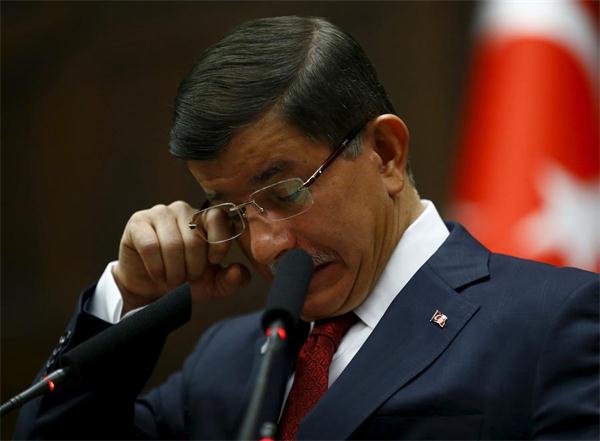Only joint global action can end IS menace
Updated: 2015-11-26 10:38
By Hua Liming(China Daily)
|
||||||||
 |
|
Turkish Prime Minister Ahmet Davutoglu delivers a speech at Turkish Parliament in Ankara, Turkey, on Nov. 25, 2015. Turkish Prime Minister Ahmet Davutoglu said on Wednesday that Turkey does not aim to escalate tension with Russia. [Photo/Agencies] |
After Turkey shot down a Russian fighter jet near its border with Syria on Tuesday, observers are wondering the real reason behind the incident. While some analysts say it might be an accident, more tend to link it with Turkey’s disputes with Russia.
It is too early to reach a definitive conclusion, but the two countries have been at loggerheads since Russia started its air strikes against Islamic State targets in Syria. Turkey wants Syrian President Bashar al-Assad to go. But by reportedly targeting the IS group and the rebel Syrian forces both, Russia, many believe, is protecting Assad.
And since Turkey has repeatedly alleged that Russia is violating its airspace and claims to have warned the Russian jet before shooting it down, one can say it is not an accident.
The incident has triggered a diplomatic storm, with Russian President Vladimir Putin calling it “a stab in the back” and Turkish Prime Minister Ahmet Davutoglu saying Turkey has the right and duty to “take measures against anybody who violates (its) borders”. Also, since Putin and Turkish President Tayyip Erdogan both are known for advocating nationalism, they have to maintain tough postures in a bid to strengthen their support base at home. As a result, Russia-Turkey diplomatic relations could suffer in the near future.
But the likelihood of a war breaking out between the two countries is rather remote. It is true that Russia launched the air strikes in Syria to get an upper hand in the competition with Western powers. But a war with Turkey will be a very heavy economic burden for Russia, especially because it already faces severe economic constraints. As for Turkey, the losses it will suffer in a war with Russia will be simply too heavy to bear.
There have been at least 10 wars between Russia and Turkey over the past centuries, and neither side wants another this century. The two sides, therefore, could raise the pitch of their rhetoric but a war between them looks unlikely.
The incident will affect Russia’s Middle East policy, though. Moscow may not make major changes to its Middle East policy in the near future in order to maintain its strong presence in the region, but it could withdraw its forces from Syria earlier than originally planned.
Besides affecting Turkey-Russia relations, the incident also highlights a sordid fact. The IS has maintained its hold over parts of Iraq and Syria for more than one year using just conventional weapons, which are no match for those possessed by the United States and Russia, even Turkey, yet it shows no signs of being defeated. And the main reason for this is the lack of coordination among the powers fighting terrorism.
The US, Russia and France, three global powers, and Turkey, a regional power, have been pounding IS targets separately, but they have failed to form a common front to save people from the IS’s abusive rule because of their different strategic and tactical purposes. All they are doing is defending their own narrow interests. The US and France want Assad to go while Russia is against any regime change in Syria. It is this conflict of interests that has created enough strategic space for the IS group to survive.
If this situation is not changed, the IS will gain in strength and continue to hold large parts of Iraq and Syria and make life hell for people under its rule. That would be against the long-term interests of global and regional powers, because the growth of the IS will fuel more terrorist attacks, from which no country is today safe. Therefore, all the powers fighting terrorism in the Middle East should join hands to not only eliminate the IS, but also do justice to their common cause.
The author is former Chinese ambassador to Iran and an expert on Middle Eastern studies. The article is an excerpt from his interview with China Daily’s Zhang Zhouxiang.
- Global health entering new era: WHO chief
- Brazil's planning minister steps aside after recordings revelation
- Vietnam, US adopt joint statement on advancing comprehensive partnership
- European border closures 'inhumane': UN refugee agency
- Japan's foreign minister calls A-bombings extremely regrettable
- Fukushima impact unprecedented for oceans: US expert

 Stars of Lijiang River: Elderly brothers with white beards
Stars of Lijiang River: Elderly brothers with white beards
 Wealthy Chinese children paying money to learn British manners
Wealthy Chinese children paying money to learn British manners
 Military-style wedding: Fighter jets, grooms in dashing uniforms
Military-style wedding: Fighter jets, grooms in dashing uniforms
 Striking photos around the world: May 16 - May 22
Striking photos around the world: May 16 - May 22
 Robots help elderly in nursing home in east China
Robots help elderly in nursing home in east China
 Hanging in the air: Chongqing holds rescue drill
Hanging in the air: Chongqing holds rescue drill
 2.1-ton tofu finishes in two hours in central China
2.1-ton tofu finishes in two hours in central China
 Six things you may not know about Grain Buds
Six things you may not know about Grain Buds
Most Viewed
Editor's Picks

|

|

|

|

|

|
Today's Top News
Liang avoids jail in shooting death
China's finance minister addresses ratings downgrade
Duke alumni visit Chinese Embassy
Marriott unlikely to top Anbang offer for Starwood: Observers
Chinese biopharma debuts on Nasdaq
What ends Jeb Bush's White House hopes
Investigation for Nicolas's campaign
Will US-ASEAN meeting be good for region?
US Weekly

|

|







